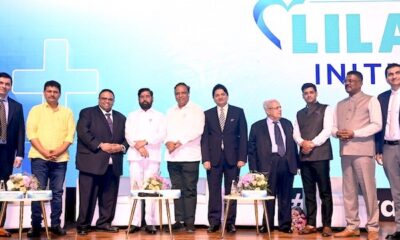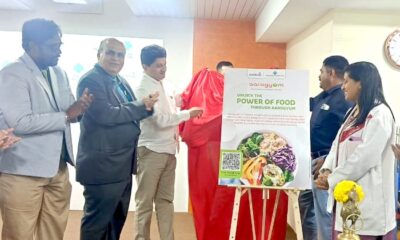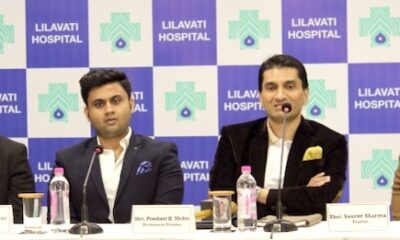Connect with us
Published
1 year agoon

Mumbai,27th Oct 2023: Lilavati Hospital & Research Center, Bandra has made a remarkable medical breakthrough by performing a complex heart surgery to remove a benign tumor of the heart, called myxoma, in a 50-year-old man with the rare “Gerbich Phenotype” blood group system. This resulted in the formation of anti-Ge2 allo-antibody, causing his blood to not match with anyone else’s. The patient underwent a successful Coronary artery bypass grafting (CABG) surgery with the removal of the myxoma tumor from his heart without requiring any external blood transfusion.
Myxomas are extremely rare tumors that can develop in the heart and disrupt normal cardiac function. However, this case presented an additional challenge due to the patient’s Gerbich Phenotype blood group, which is found in less than 0.01% of the Indian population. The team at Lilavati Hospital Dr Pavan Kumar- cardiovascular & Thoracic Surgeon, Dr Abhay Bhave-Hematologist, Dr Ruhi Mehra, Consultant – Transfusion Medicine and Dr Nitin Chavan, Co-Ordinator Pathology & Transfusion Medicine utilized state-of-the-art techniques and innovative approaches to ensure the safe removal of the tumor while minimizing potential complications associated with the patient’s unique blood group.
A 50-year-old patient named Mr. Rajesh Agarwal from Yavatmal, Nagpur, underwent routine heart checkup due to chest pain, which led to the discovery of a mass in his heart. This finding was confirmed by cardiac MRI and identified as myxoma – a tumor within the heart. He was then referred to, Dr. Pavan Kumar at Lilavati Hospital in Bandra. Where an echocardiography revealed that the tumor resided in Mr. Agarwal’s right atrium of his heart. Further assessment through coronary angiography unveiled severe triple vessel coronary artery diseases which necessitated Coronary Artery Bypass Grafting (CABG) surgery as suggested treatment.
As per Hospital’s protocols, the patient underwent blood group testing prior to scheduling his surgery, to reserve blood for transfusion during the surgery. The patient was found to have AB Positive blood group, which is quite common. In spite of this, his blood was not matching with any of the nearly 50 donor blood units tested (including O Negative blood group). Further extensive immuno-hematological analysis revealed that the patient possessed an additional rare blood group antibody.
Dr Pavan Kumar- Cardiovascular & Thoracic Surgeon at Lilavati Hospital Said “An unexpected challenge arose when it became apparent that patient Mr. Rajesh Agarwal’s blood did not match with any available donors during routine blood group cross matching conducted at Lilavati blood center prior to CABG surgery. The patient’s mother, three siblings and two sons blood were tested but none of them were found compatible. This was a very complicated situation as heart surgery may require blood transfusion during surgery.”
Dr.Ruhi Mehra -Consultant – Transfusion Medicine Said “It was decided that to manage this unique case further investigations were needed. Hence to gain more insight into this rare abnormality, Mr. Agarwal’s blood sample was sent to the International Blood Group Reference Laboratory (IBGRL), Bristol, UK. The IBGRL confirmed that the patient’s cells had the rare Gerbich Phenotype (GE: -2, -3, 4) due to which the patient had formed a clinically significant anti-Ge2 allo-antibody. They informed that only eight same blood group phenotype donors are registered in the International rare blood group donor registry. This made it likely that Mr. Agarwal’s case was the first of its kind in the country.”
After receiving his diagnosis, Lilavati’s team of doctors decided that during the surgery, the patient’s own blood would be used in order to prevent any potential complications from mismatched transfusions. The patient was consulted & planned to donate his own blood three times over a period of three weeks before surgery date on October 18th, 2023. The surgical procedure successfully performed by removing a heart tumor myxoma by performing triple coronary bypass using the patient’s own blood.
Lt. Gen. (Dr.) V Ravishankar, COO & Senior Consultant – Cardiothoracic Surgery said “This case highlights the fact that co-operation, co-ordination and communication between various departments plays a significant role in the management of such complex and rare cases. If such a patient had been taken to surgery without performing his blood group prior or without reserving blood for him prior, then it would not have been possible to provide any fully compatible blood unit to the patient while he would have been on the operating table. Patient blood management strategies help in resolving such cases by adopting restrictive transfusion strategy, building up the patient’s hemoglobin prior to any planned surgery and by using blood salvage techniques during the surgery to minimize their blood loss. The multi-disciplinary approach adopted at Lilavati Hospital highlights the fact that such rare cases can also be handled with utmost care in order to obtain the desired favorable outcomes. “
Mr. Rajesh Agarwal, a patient, was shocked to discover consecutive health problems said “First, a heart tumor was found, and when we went to Lilavati Hospital to have it removed, an echocardiogram revealed blockages in the heart. As a result, a coronary artery bypass graft (CABG) was planned. During a routine blood collection for the surgery, it was discovered that blood did not match due to a rare Gerbich Phenotype. However, the doctors and staff at Lilavati Hospital suggested a suitable treatment. They collected my own blood for a successful transfusion, which ultimately gave me a new lease on life.”


Lilavati Hospital Announces New State-Of-The-Art Cancer Care Institute In Mumbai & Commencement of their Collaboration With The Mayo Clinic, USA for the first ever Nursing Excellence Program, In India


Miraculous Millet Menu: Lilavati Hospital Launches Millet-Based Food Diet To Boost Patient Recovery
On the Occasion of World Plastic Surgery Day, Free Cosmetic Screening Camp for Women at Lilavati Hospital


Lilavati Hospital Celebrated International Nurses Day with Theme “Fairies In Aprons”


Lilavati Kirtilal Mehta Medical Trust Board Has Exposed A Major Financial Fraud Amounting Around Rs. 500 Crores, Making It Serious Medical Scam
Lilavati Hospital, Mumbai Appoints New Dynamic Board Of Trustees
